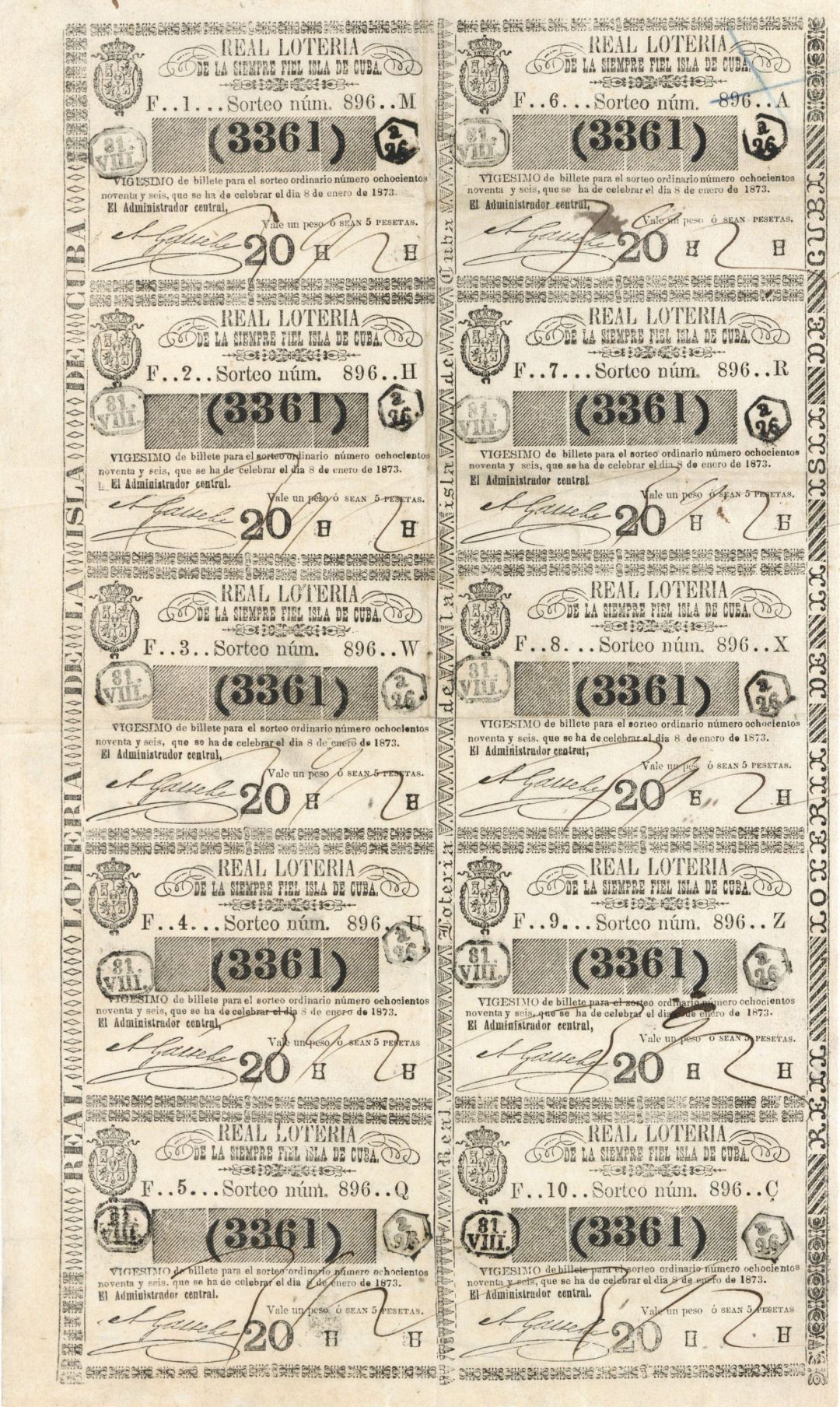Cuba Uncut Sheet of 10 Notes - Cuban Lottery Ticket Sheet
Inv# FB6784 BondUncut Sheet of 10 Cuban Lottery Tickets.
Lotería (Spanish word meaning "lottery") is a traditional game of chance, similar to bingo, but using images on a deck of cards instead of numbered ping pong balls. Every image has a name and an assigned number, but the number is usually ignored. Each player has at least one tabla, a board with a randomly created 4 x 4 grid of pictures with their corresponding name and number. Players choose a tabla (Spanish word for "board") to play with, from a variety of previously created tablas, each with a different selection of images.
The traditional Lotería card deck is composed of a set of 54 different cards, each with a different picture. To start the game, the caller (cantor , Spanish for "singer") shuffles the deck. One by one, the caller picks a card from the deck and announces it to the players by its name, sometimes using a verse before reading the card name. Each player locates the matching pictogram of the card just announced on their board and marks it off with a chip or other kind of marker. In Mexico, it is traditional to use small rocks, crown corks or pinto beans as markers. The winner is the first player that shouts "¡Buena!" or "¡Lotería!" right after completing a tabla or a previous agreed pattern: row, column, diagonal, or a pozo.
The origin of lotería can be traced far back in history. The game originated in Italy in the 15th century and was brought to New Spain (modern Mexico) in 1769. In the beginning, lotería was a hobby of the upper classes, but eventually it became a tradition at Mexican fairs.
Don Clemente Jacques began publishing the game in 1887. His version of the game was distributed to Mexican soldiers along with their rations and supplies.
The images Don Clemente used in his card designs have become iconic in Mexican culture, as well as gaining popularity in the U.S. and some European countries. Don Clemente's cards also had a part in representing and normalizing different aspects of Mexico's national identity during the 19th century. This can be seen with the card of El Soldado (Spanish for "the soldier") which was used as a symbol to reference war as a part of Mexico's national identity during that time. Many of the pictures used in Don Clemente's lotería resemble the Major Arcana of Tarot cards used for divination (which, in turn, are based on cards used in Tarot card games). Other popular lotería sets are Lotería Leo, Gacela and Lotería de mi tierra.
A lottery is a form of gambling that involves the drawing of numbers at random for a prize. Some governments outlaw lotteries, while others endorse it to the extent of organizing a national or state lottery. It is common to find some degree of regulation of lottery by governments. The most common regulation is prohibition of sale to minors, and vendors must be licensed to sell lottery tickets. Although lotteries were common in the United States and some other countries during the 19th century, by the beginning of the 20th century, most forms of gambling, including lotteries and sweepstakes, were illegal in the U.S. and most of Europe as well as many other countries. This remained so until well after World War II. In the 1960s, casinos and lotteries began to re-appear throughout the world as a means for governments to raise revenue without raising taxes.
Lotteries come in many formats. For example, the prize can be a fixed amount of cash or goods. In this format, there is risk to the organizer if insufficient tickets are sold. More commonly, the prize fund will be a fixed percentage of the receipts. A popular form of this is the "50–50" draw, where the organizers promise that the prize will be 50% of the revenue. Many recent lotteries allow purchasers to select the numbers on the lottery ticket, resulting in the possibility of multiple winners.
A bond is a document of title for a loan. Bonds are issued, not only by businesses, but also by national, state or city governments, or other public bodies, or sometimes by individuals. Bonds are a loan to the company or other body. They are normally repayable within a stated period of time. Bonds earn interest at a fixed rate, which must usually be paid by the undertaking regardless of its financial results. A bondholder is a creditor of the undertaking.










Ebay ID: labarre_galleries